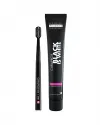











 Swiss premium oral care
Swiss premium oral care
 United Arab Emirates
United Arab Emirates

Variants

Activated carbon for gentle, daily whitening

Gentle to teeth and gums, thanks to 8,760 bristles

Boost your oral defences with three natural enzymes

Activated carbon for gentle, daily whitening

Gentle to teeth and gums, thanks to 8,760 bristles

Boost your oral defences with three natural enzymes
A charcoal toothpaste. It’s as black as night. But it gently whitens. The activated carbon simply absorbs unattractive, discoloured particles.
Refreshingly lemony
«Black is white» whitening toothpaste removes discolouration using activated carbon without abrading or bleaching. includes fluoride. Strengthens oral health: enzymes protect against tooth decay and support the salivary functions. Hydroxyapatite (nano) remineralize tooth enamel and seal exposed dentine channels.
Plus: Physical blue filter; cooling sensation while brushing.
No SLS. No triclosan. No bleaching agents. No plastic particles.
Can be used as a regular toothpaste without any limitations.
Made in Switzerland.
Ingredients:
Aqua, Sorbitol, Glycerin, Hydrated Silica, Charcoal Powder, Aroma, Decyl Glucoside, Cocamidopropyl Betaine, Sodium Monofluorophosphate, Xanthan Gum, Tocopherol, Mica, Hydroxyapatite (nano), Potassium Acesulfame, Titanium Dioxide, Sodium chloride, Microcrystalline Cellulose, Potassium Chloride, Citrus Limon Peel Oil, Sodium Hydroxide, Amyloglucosidase, Methyl Dispropyl Propionamide, Zea Myas Starch, Menthyl Lactate, Ethyl Menthane Carboxamide, Glucose Oxidase, Potassium Thocyanate, Stearic Acid, Mannitol, Maltodextrin, Urtica Dioica Leaf Extract, Cetearyl Alcohol, Hydrogenated Lecithin, Tin Oxide, Sodium Bisulfate, Lactoperoxidase, Limonene
Not suitable for Vegans
 Swiss premium oral care
Swiss premium oral care

